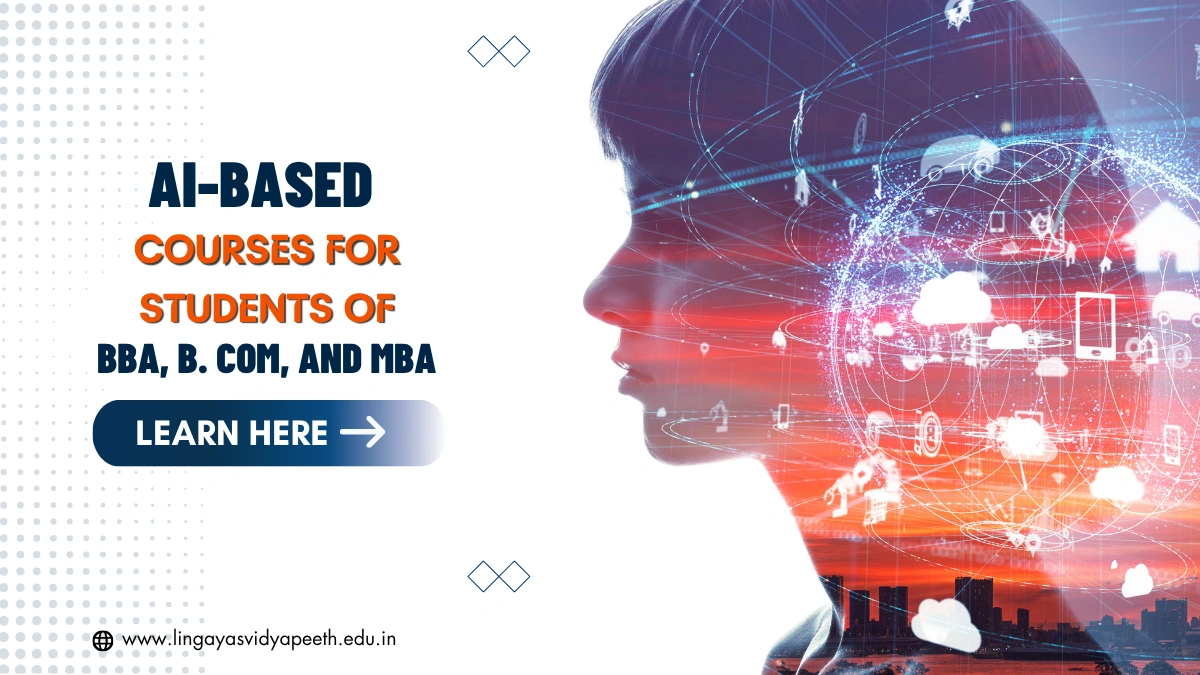Home » AI-Based Courses for Students of BBA, B. Com, and MBA

Artificial Intelligence (AI) is no longer a futuristic concept—it is already transforming the way businesses operate globally. From automating routine tasks to enhancing customer experiences and predicting market trends, AI has become a critical tool in the modern workplace. For students pursuing BBA (Bachelor of Business Administration), B. Com (Bachelor of Commerce), and MBA (Master of Business Administration), understanding AI and integrating it into their skill set is no longer optional—it is a necessity for thriving in a data-driven, digital-first economy.
This blog explores why AI-based courses are critical for commerce and management students, the types of courses available, practical ways to learn AI, and the career opportunities they unlock.
Traditionally, management and commerce students have focused on subjects like finance, marketing, economics, organizational behaviour, and accounting. These subjects form the backbone of business education, but the business world is changing rapidly. Today, organizations rely on data-driven decision-making, where insights derived from large datasets shape strategy, operations, and customer engagement.
AI sits at the heart of this transformation. By leveraging AI and machine learning algorithms, businesses can:
By integrating AI knowledge into their education, students of BBA, B. Com, and MBA can gain a competitive edge in the workforce. They can complement traditional management skills with AI expertise, making them more attractive to employers.
There are numerous AI-focused courses available through universities, online platforms, and professional training institutes. Here are the most relevant courses for commerce and management students:
Students can explore AI learning through online platforms, government initiatives, and educational institutions:
Additionally, some courses offer certifications that can be showcased to potential employers, improving credibility and employability.
Learning AI offers several tangible benefits:
AI skills combined with business and commerce knowledge can unlock numerous career paths:
By combining traditional management skills with AI expertise, graduates can remain highly competitive in the evolving job market.
AI adoption in business is accelerating. According to a McKinsey report, companies that successfully integrate AI in operations and strategy can achieve productivity improvements of up to 20–30%. Roles requiring human judgment combined with AI capabilities are expected to see massive growth in the next decade.
AI is also making business education more dynamic. Top B-Schools are incorporating AI, analytics, and digital strategy into their core curriculum, ensuring that students are prepared for a tech-enabled business environment.
For students of BBA, B. Com, and MBA, AI-based courses are not optional add-ons—they are essential for professional success. By mastering AI tools and understanding their applications across marketing, finance, operations, and strategy, students can:
The best time to act is now. Enrolling in AI courses during undergraduate or postgraduate studies can provide a significant competitive edge, transforming students into dynamic professionals ready to thrive in the AI-driven business era.
In the age of digital intelligence, combining traditional business knowledge with AI expertise is not just a career advantage—it’s the key to becoming a leader in tomorrow’s business world.
Also Read
Industry-Focused Financial Education for Future Careers
Financial Planning for Circular Economy in Manufacturing
AI & Automation: The Future of Human Resource Management
From
Deep Biswas
Assistant Professor
School of Commerce and Management
RECENT POSTS
CATEGORIES
TAGS
Agriculture Agriculture future AI Architecture artificial intelligence Bachelor of Commerce BA English BA Psychology BTech AIML BTech CSE BTech cybersecurity BTech Engineering Business management career Career-Specific Education career guide career option career scope Civil engineering commerce and management Computer Science Computer science engineering Data science degree education Engineering Engineering students English Literature english program Fashion Design Fashion design course Higher Education Journalism journalism and mass communication law Law career Machine Learning mathematics MBA MBA specialization Mechanical Engineering Pharmacy Psychology Research and Development students
Nachauli, Jasana Road, Faridabad, Haryana
Address: C-72, Second Floor, Shivalik, Near Malviya Nagar,
Above HDFC Bank, New Delhi 110017
Landline No. - 011-46570515 / 45138169 / 41755703
Mobile No. - +91-7303152412 / +91-7303152420 / +91-9311321952
Toll Free: 1800-120-4613
Mobile : 8447744303 | 8447744304 | 8447744306 | 8447744309
8700003974 | 8700003411 | 8700003749
Copyrights © 1998 - 2026 Lingaya's Vidyapeeth (Deemed To Be University). All rights reserved.
LV only conducts physical/online verification of any document related to examination on the following email id:
It is important to note that the following email IDs and domains are fraudulent and do not belong to our university.